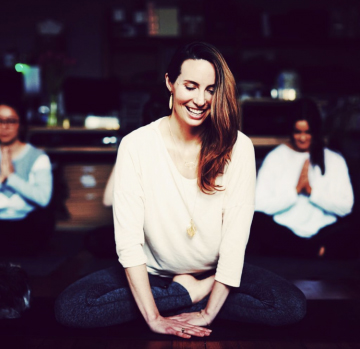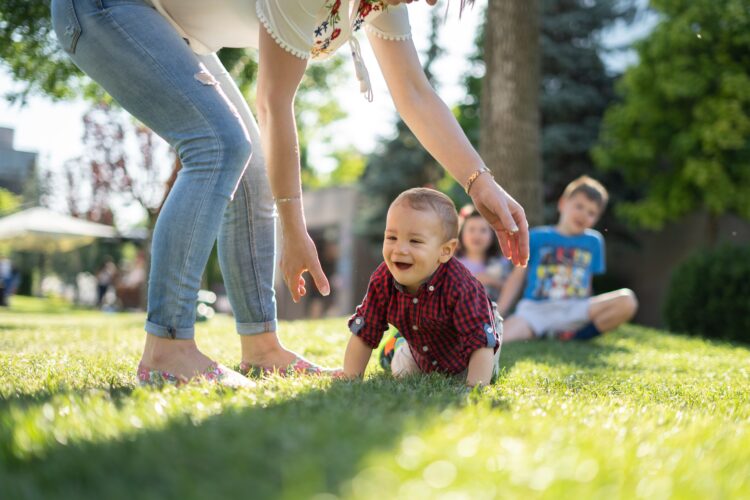Stress might feel inevitable when you have your hands full caring for little ones. Try these expert tips for parents from yoga and wellness instructor Lydia Sasse

We are all feeling more anxious and stressed in these uncertain times, and for parents, they are finding it harder to carve out time for themselves to relax. According to research by Sudocrem, 43% of parents often find themselves feeling stressed.
Children demand our time and attention, but it’s really important to find time to destress and soothe ourselves as parents too, yoga and wellness coach Lydia Sasse says.
“I think that we are now in this situation where our nervous system is really frazzled, because we are not getting any time to recharge ourselves on our own. A lot of us are spending 24 hours a day with our kids,” Lydia says.
She describes our nervous system as a cup, and when it is full to the point of overflowing, and by not making time to relax, we aren’t able to empty that cup out.
“When that cup is full, and we don’t bring it back down to a more balanced level, we are more likely to snap at our kids and our partners, and get into a negative feedback cycle with our thoughts,” Lydia says. “So now more than ever it is really important for us to take time to look after not only our physical health but our emotional health as well.”
Sudocrem is working with Lydia as part of the Sudocrem Soothing Families campaign, sharing suggestiosn to help parents relax.

4 ways to make time to relax in a busy household
1. Make it a family activity
“We are in this unique situation where we have an opportunity to set a wellness routine that incorporates the whole family now. That has always been something that is very important to do but most of us just haven’t had the time or space before now to do it,” Lydia says.
Having our kids at home with us all day means that they get to see what we do all day while they are usually at school.
“We have the opportunity to template, for them, healthy models of behaviour. That doesn’t mean that we hide from them when we are feeling angry, sad or challenged,” Lydia says.
“Instead, you might say to them, ‘I am feeling really sad right now, what I find really helps me when I am sad is to sit and read my favourite book with a cup of tea for five minutes’. They can play by themselves then or they can sit in your lap for that time. Or it could be doing yoga for a while and they can join you if they like. Then they get to see what are healthy ways for us to process emotions or challenging moments rather than pretending they don’t happen.” Try making these 5 rituals a part of your family’s day.
2. Understand each other’s needs
Every person is different, and during isolation, extroverts and introverts might find themselves spending a lot of time at home together. This can be draining for all involved, and as parents, Lydia suggests we learn to cater to each other’s needs in order to facilitate our own time to recharge.
“I have one child, which in many ways is easier, but what is more challenging is that he doesn’t have anyone else to play with. He is an extrovert and I am an introvert — I recharge with time on my own, but he recharges by being around people. Those two things are at loggerheads with each other,” Lydia says.
“We find ways to work around it. I find that if I give him my full attention for a period of time, where I am nowhere near my phone and not trying to do anything else at the same time, I am just playing with him, he feels that he is getting my 100% attention,” she says.
“He is much more likely to play quietly on his own then afterwards if I want to read my book in a corner for a while or do my meditation. If I am half doing something, he feels that and is more needy for my attention.”
3. Make time for your mind, no matter what
If your house is busy and chaotic, time to meditate may feel out of your grasp. But taking time for ourselves will benefit those around us too.
“It’s funny, because in the yoga and meditation community, it is said that if you don’t have time to meditate, that is when you need it most. That really is the truth,” Lydia says.
“The problem is that our children are totally wrapped up in us, so how our nervous system is directly corresponds to how their nervous system is responding. If we are walking around feeling frazzled then their behaviour is more likely to be frenetic too. It really does benefit everyone in the immediate vicinity to do something for ourselves to make us feel calm.”
4. It only takes a minute (yes, really)
Whatever you choose to do to relax, whether that is a breathing exercise, meditation or yoga, it doesn’t have to take a massive chunk of your time.
“Research shows that you can do a 20 minute meditation once a day, or you can do 20 one minute meditations throughout the day, and they will have the same benefits on the body. I think the problem that people get stuck on is that they think for anything to be of benefit it has to be a big chunk of time, but that’s not the case,” Lydia says.
“It’s not about trying to do something that is unachievable, because then we don’t do it and we feel guilty on top of all the other things we have to feel guilty about. And really, no matter the chaos that is going on around us, we all have one minute.”
Take a look at what’s inside the new issue of Irish Country Magazine here.
Main image: Jordan Rowland on Unsplash








